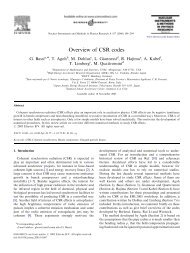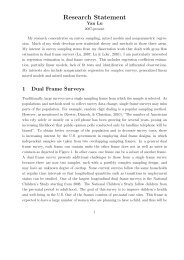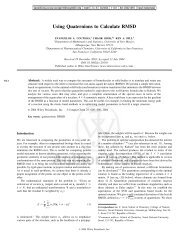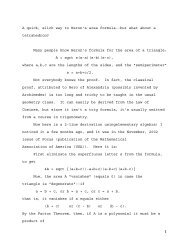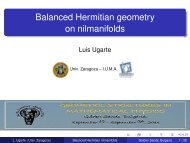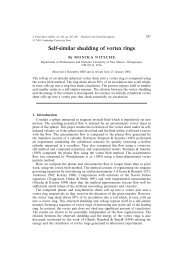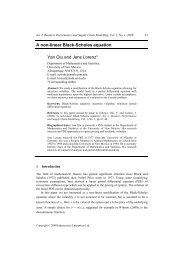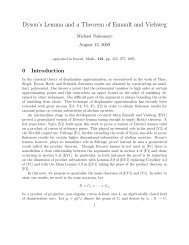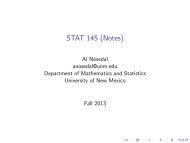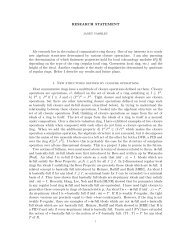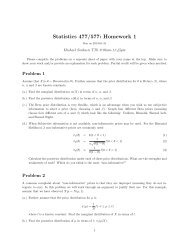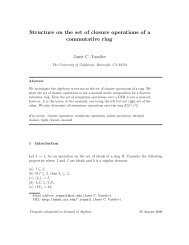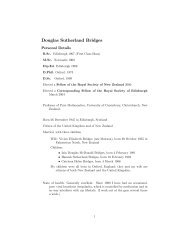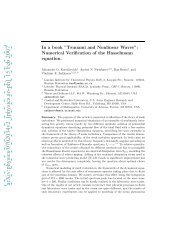OEO Office of Equal Opportunity - Department of Mathematics and ...
OEO Office of Equal Opportunity - Department of Mathematics and ...
OEO Office of Equal Opportunity - Department of Mathematics and ...
Create successful ePaper yourself
Turn your PDF publications into a flip-book with our unique Google optimized e-Paper software.
166 ARTS AND SCIENCES<br />
Fall date (February) is observed for financial aid. Early application<br />
is strongly recommended; application is made to the<br />
<strong>Office</strong> <strong>of</strong> Graduate Studies. The GRE is required for admission<br />
to both the M.A. <strong>and</strong> the Ph.D. programs. All applications<br />
must be postmarked on or before the due date.<br />
Degree Requirements<br />
M.A. in Communication<br />
Concentrations: interpersonal communication, intercultural<br />
communication, organizational communication, rhetorical communication,<br />
mass communication <strong>and</strong> health communication.<br />
The Master <strong>of</strong> Arts in Communication is <strong>of</strong>fered under three<br />
options—Plan I (thesis), Plan II (project) <strong>and</strong> Plan III (comprehensive<br />
exam)—according to regulations set forth in earlier<br />
pages <strong>of</strong> this catalog.<br />
Students are required to complete 500, 501, 507, 538 or 608<br />
<strong>and</strong> one seminar course in their chosen area <strong>of</strong> concentration,<br />
which includes 514, 521, 531, 544, 550 <strong>and</strong> 561.<br />
NOTE: Students are required to complete 500 <strong>and</strong><br />
501 during the earliest semesters they are available<br />
following admission. All plans require a minimum <strong>of</strong> 36<br />
credit hours, with at least 27 hours in communication.<br />
A tentative plan <strong>of</strong> study form should be submitted by<br />
the second semester, so as to reflect the student’s<br />
major <strong>and</strong> minor interests. Contact the director <strong>of</strong><br />
graduate studies for additional information.<br />
Each c<strong>and</strong>idate is assisted by a committee <strong>of</strong> at least three<br />
faculty members, one <strong>of</strong> whom must be from outside the<br />
department, for Plan I. C<strong>and</strong>idates must prepare a detailed<br />
prospectus <strong>and</strong> have it approved by their committee prior to<br />
proceeding with research for the thesis (Plan I) or beginning<br />
work on a project (Plan II). C<strong>and</strong>idates must submit a written<br />
thesis or project report to their committee for examination.<br />
C<strong>and</strong>idates in Plans I <strong>and</strong> II are required to complete a<br />
Master’s Examination. These examinations are conducted by<br />
the c<strong>and</strong>idate’s committee following completion <strong>of</strong> the thesis<br />
or project. This examination emphasizes the thesis or project<br />
<strong>and</strong> assesses the c<strong>and</strong>idate’s ability to relate his or her formal<br />
course <strong>of</strong> study to the thesis or project. C<strong>and</strong>idates must<br />
submit their Program <strong>of</strong> Studies for approval for a master’s<br />
degree prior to completing this examination. C<strong>and</strong>idates<br />
should consult with their thesis or project advisor concerning<br />
deadlines <strong>and</strong> specific procedures.<br />
C<strong>and</strong>idates in Plan III must complete 36 hours <strong>of</strong> course work<br />
<strong>and</strong> a comprehensive exam. In order to take the comprehensive<br />
exams students must have completed 30 units <strong>and</strong> have<br />
taken all the required courses.<br />
Minor in Communication<br />
for Master’s Students<br />
Students getting a Master’s degree in other departments<br />
may select a minor in Communication. The minor requires 12<br />
credit hours <strong>of</strong> graduate course work. CJ 500 is required <strong>and</strong><br />
should be taken as soon as possible. Students must consult<br />
with the CJ Graduate Director for advisement before taking<br />
500. There is a 3 credit maximum on Graduate Problems<br />
(CJ 593).<br />
Ph.D. in Communication<br />
Graduate study in the <strong>Department</strong> <strong>of</strong> Communication <strong>and</strong><br />
Journalism aims to prepare students to become scholars <strong>and</strong><br />
pr<strong>of</strong>essionals who are conversant with one or more areas<br />
in the field <strong>of</strong> communication. <strong>Department</strong>al faculty <strong>of</strong>fer<br />
courses in rhetorical <strong>and</strong> communication theory; interpersonal;<br />
organizational <strong>and</strong> public communication; mass communication;<br />
language <strong>and</strong> behavior; health communication;<br />
<strong>and</strong> intercultural communication. Because <strong>of</strong> the wide diversity<br />
<strong>of</strong> disciplinary approaches represented in the work <strong>of</strong> the<br />
department, the graduate program is open to students with<br />
undergraduate preparation in communication, journalism,<br />
the humanities, the social sciences <strong>and</strong> other fields related<br />
to the study <strong>of</strong> human communication. For all c<strong>and</strong>idates,<br />
admission must be approved by the departmental committee<br />
on graduate studies.<br />
Academic requirements for the Ph.D. in Communication<br />
consist <strong>of</strong> an intensive program <strong>of</strong> course work, research <strong>and</strong><br />
pr<strong>of</strong>essional development. The doctoral degree requires a<br />
minimum <strong>of</strong> 48 graduate credit hours with at least 36 graduate<br />
credit hours <strong>of</strong> course work beyond the Master’s degree.<br />
Course work requirements include the following: nine departmental<br />
course credit hours in research methods (these hours<br />
may be obtained by taking any three <strong>of</strong> the following four<br />
courses: 507, 538, 607 <strong>and</strong> 608. However, if the student has<br />
not taken 507 or an acceptable equivalent, 507 must be one<br />
<strong>of</strong> the three courses chosen.); two 600-level courses in communication<br />
theory (including both the history <strong>and</strong> philosophy<br />
<strong>of</strong> communication study <strong>and</strong> theory construction); one 600-<br />
level course in intercultural communication theory. In addition<br />
to these core courses, Ph.D. c<strong>and</strong>idates will select elective<br />
courses from any <strong>of</strong> the Communication & Journalism<br />
courses marked for graduate credit in this catalog.<br />
Ph.D. c<strong>and</strong>idates also will be required to satisfy a research<br />
skills requirement by demonstrating competency in two<br />
languages (one <strong>of</strong> which is English) or, alternatively, in a<br />
computer language or in a computer-related data-analysis<br />
skill as determined by the c<strong>and</strong>idate’s committee on graduate<br />
studies.<br />
Communication <strong>and</strong> Journalism<br />
(CJ)<br />
101L. Introduction to Communication. (3)<br />
Principles <strong>and</strong> concepts <strong>of</strong> various types <strong>of</strong> human communication<br />
including interpersonal, small group, organizational,<br />
public <strong>and</strong> mass communication. Two hrs. lecture, 1 hr. lab.<br />
110. Introduction to Mass Communication. (3)<br />
(Also <strong>of</strong>fered as MA 110.) The development <strong>of</strong> the mass<br />
media with emphasis on television in the areas <strong>of</strong> programming,<br />
policy, regulations, economics <strong>and</strong> technology.<br />
Examination <strong>of</strong> the social, cultural <strong>and</strong> political impact <strong>of</strong> the<br />
mass media on contemporary society.<br />
115. Communication Across Cultures. (3)<br />
(Also <strong>of</strong>fered as AFAM 115.) An introduction to communication<br />
among people from different cultural backgrounds,<br />
emphasizing intercultural relations. The class seeks to identify,<br />
honor <strong>and</strong> enhance the strengths <strong>of</strong> different cultural<br />
perspectives.<br />
130. Public Speaking. (3)<br />
A performance course that deals with the analysis, preparation<br />
<strong>and</strong> presentation <strong>of</strong> speeches. Meets New Mexico Lower<br />
Division General Education Common Core Curriculum Area I:<br />
Communications (NMCCN 1113).<br />
171L. Writing for the Mass Media I. (3)<br />
Practical introduction to journalism, emphasizing journalistic<br />
conventions <strong>and</strong> the gathering <strong>and</strong> writing <strong>of</strong> news for the<br />
print <strong>and</strong> broadcast media. Language <strong>and</strong> typing skills<br />
required.<br />
Prerequisites: 15 hrs., 2.00 GPA, ENGL 102.<br />
220. Communication for Teachers. (3)<br />
Concepts <strong>and</strong> practices <strong>of</strong> interpersonal, small group <strong>and</strong><br />
public communication pertinent to classroom teachers at the<br />
elementary, middle <strong>and</strong> secondary levels <strong>of</strong> education.<br />
221. Interpersonal Communication. (3)<br />
Analysis <strong>of</strong> a variety <strong>of</strong> interpersonal communication concepts,<br />
with special emphasis on the application <strong>of</strong> communi-<br />
UNM CATALOG 2006–2007 Symbols, page 611.



